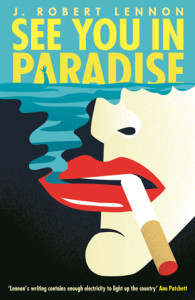J. Robert Lennon: Short, weird stuff
by Mark Reynolds
Author portrait © Lindsay France
We talk to the author of Familiar about his new story collection See You in Paradise, the story ‘The Wraith’ (published here), music, adaptations, and other creative engagements.
MR: ‘The Wraith’ touches on a lack of political engagement, our complex and disturbing inner lives, the disabling terror of depression, a refusal to accept the anodyne, the hopes and fears of impending parenthood, sex with an otherworldly being, and much more besides. Which came first, and what brought all the story’s themes together?
JRL: During the Bush years, my wife and I were obsessed with politics, and it had an effect on our marriage. Not a harmful one – we tend to agree about such things – but the man was always part of our lives. It was easy to imagine a relationship where this could break something irrevocably, so I invented a couple for whom this might be possible. When I tried to imagine what form Lurene’s misery might take should it become detached from her body, I thought of a statue, and that gave rise to the wraith. Also, I think I’d read somewhere that a wraith was the ghost of someone still alive, and this sounded like a metaphor for depression.
What disturbs you most about American politics?
They seem designed to make thinking people want to ignore them. You can’t look straight at that stuff and not want to look away.
‘The Wraith’ was first published in Playboy. Was it written with that readership in mind? (And was the opening story in the collection ‘Portal’ written specifically for Weird Tales?) Or do you always write a story first and let it find its audience afterward?
Write first, audience after. There’s a rather crass vein running through my work, and Amy Grace Lloyd, fiction editor for Playboy at the time, became its advocate and enabler for a few years – she published three or four stories. I can’t remember how the Weird Tales story happened, whether I was solicited or if I volunteered the piece, but Ann VanderMeer edited and published it, and I’m grateful to her. My stories are written exclusively to amuse myself, and I seek out a place to publish after I’ve done what I felt like doing. Thinking about audience just confuses me. I’m the audience.
There are echoes throughout the collection of your most recent novel Familiar, with themes of family and identity, parallel or alternative lives, and friction between the real and the imagined. When did you first start mixing straight narrative and the supernatural?
Very early on – when I was still in college. I grew up reading Stephen King and lots of classic science fiction, and still love good genre fiction of all kinds. Borrowing from it feels natural to me. I do think I’ve been developing it more over the past ten years, though – Familiar is definitely an example of it.
In that novel, the angry Silas says (about making video games) “Life is inherently nonsensical. Drawing strands of meaning together is for idiots.” In what ways is he right and wrong?
Oh, it’s nonsensical, all right! But drawing strands of meaning together is what makes it interesting. Silas shares a lot of my convictions but draws the opposite conclusions from them.
See You in Paradise contains 14 stories written over 15 years. How many others did you write during that time, and will the next collection also include stories from that period?
There were probably 30 conventional-length stories and many, many more shorter things. Of the 30, I gave my editor, Ethan Nosowsky, 20, and he pared them down to 13. (I persuaded him to put one back in.) If those are the greatest hits, then the rest are bonus tracks; I’m hoping to issue an eBook of some next fall. The short, weird stuff is slowly accumulating in a totally different manuscript. (‘Doors’, the other story you published, is in there.)
How often do you still write microfiction?
I’ve gotten back into it in the past year. So, often. I’ve been writing it in a notebook, instead of on a computer. It doesn’t make much of a difference in terms of quality or style, but it feels good.
In your non-fiction collection Video Game Hints, Tricks and Cheats (available as a free download here), you say that writers actually spend very little time writing. How would you summarise a typical writing day?
Whoa, you’ve read that?? I’m afraid there is no typical writing day; writing is usually a small part of a day packed with other obligations. Lately I do it on the sofa on the days I don’t teach, or at a coffee shop with friends. The latter is a new thing for me; it’s great fun.
Your story ‘The Rememberer’ was adapted into the CBS detective series Unforgettable. Are any other adaptations under discussion? (I’d love to see someone tackle Familiar.)
For a couple of years now I’ve been revising a pilot for my novel Happyland with my writing partner Michael Caleo; we’re just about finished. I’d like to see something happen with Familiar too!
How many of your students at Cornell have so far made it as published writers?
Many. We’re lucky to have a lot of very talented, professionally capable students at Cornell, and I think their writing is great. Novelists Téa Obreht and NoViolet Bulawayo, and poet Elizabeth Rogers are some of the ones I’m most proud of, but there are many more.
What is the most significant story you remember reading in your childhood that may have sparked your instinct to write?
Arthur C. Clarke’s Tales from the White Hart and Stephen King’s Night Shift are full of such stories… I read them over and over in my adolescence.
Are you still making music with Inverse Room?
Inverse Room is my solo identity; for the past couple of years it has been in remission while I’ve been playing in The Starry Mountain Sweetheart Band, a five-piece rock outfit from Ithaca, New York, where I live. We’re putting out our second album this week, actually; the last date of the US book tour was a book and CD release party.
What are you currently working on?
A novel presently called Ghosts. It’s about a family who buys a house someone was murdered in years before. I’ve got a draft; we’ll see what happens when I try to revise it over the winter…
J. Robert Lennon is the author of seven novels and the collection Pieces for the Left Hand, stories from which have appeared in the New Yorker, Paris Review, Granta, Harper’s and Playboy. His latest novel, Familiar, a haunting psychological thriller about parenting and memory, is published by Serpent’s Tail, along with the new story collection See You in Paradise. Read more.
jrobertlennon.com


